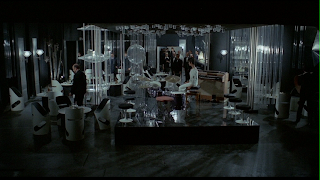
Band: Dirty Projectors
Album: Rise Above
Rel. Date: 9/11/07
Available on CD and LP from Dead Oceans![]()
Rise Above, the new album from Omnivoracious Dave Longstreth and his band, Dirty Projectors, has a creative genesis that seemingly obscures the more important qualities of the record; however, just like with The Getty Address and its tale of a fictionalized Don Henley journeying through time to serenade Pocahontas (I kid, but honestly), it doesn't benefit the listener to approach Rise Above with conceptual artifice lingering in the back of their mind. Because while what it is (an imaginative reinterpretation of Black Flag's Damaged, meaning not covers, but something else) is arguably what it is, it is more importantly an album of original music written by Mr. Longstreth and executed with the help of a number of fine musicians.
"What I See" opens the album with the refrain "I wanna live, I wanna live, I was dead" sung over a huge groove, ably introducing their organic power, developed/evolved from continuous exploration as a live unit constrained to a traditional "rock band" format. The rhythm builds, the guitars squirm between the beats, and then it evaporates into amorphous cooing for a brief interlude before jumping right back into the main groove. The song has almost concluded before acceding to a verse proper and only after a second dispersal of the kinetic forces in favor of pastoral woodwinds, all atmosphere and no Earth. This structure of drastic dynamic shifts (on "Room 13", hearkening back to Robert Fripp's Zeus-thrown power chords ripping through the haze of Jamie Muir's miscellany at the start of Lark's Tongue in Aspic or, more recently, any song by ex-Tzadik avant-metal outfit Kayo Dot), plays a large role in the latest mode of Longstreth's songwriting and never does it feel out of place or used simply to attack the listener (but it can, and will, attack).
In the past, when I've tried to sneak the Dirty Projectors into the auditory diet of those around me, I found that people either asked me to "turn that weird shit off" or they've silently sat and waited until a conclusion, then asked me that I "never play that weird shit again". A real fuckin' dichotomy, you know? Now, with Rise Above released for public consumption, I find subjects can invariably tolerate the first half (a marked improvement), asking a polite question here or there concerning this or that (thoroughly enjoying "Thirsty and Miserable"), but as soon as "Police Story" comes on, they've had enough.
Appreciation for Longstreth's vocal iniquities has always been the ledge that one's ability to cope with his music rested upon. Some may find themselves conditioned to enjoy his overwrought melisma and Gothic harmonies since his last release, but when confronted with aggressive intervalic shifts and a harsh, brittle timbre, their will shall be tested. Which is perhaps its purpose, that if you can let yourself go and grok his run through the squalor, empathize with his expression even if you doubt his authenticity as a "fuck the police" rebel-type, you will be rewarded for your struggle with the best end-of-album sequence since Return to Cookie Mountain (although I still think "Wash the Day" is shit).
From the o-o-o-o-o-o choral arrangements of "Gimme Gimme Gimme" to the unacknowledged suite of "Spray Paint (The Walls)" and "Room 13", adorned with mourning string arrangements pulling every last bit of emotion from Longstreth's fragile upper register, as well as some of the finest bombast the band can muster, he would've already earned the dinosaur sticker for his notebook. Yet, in true dessert fashion, he saved the best for last, buttering me up for an A+, instructing me to "rise above" lest I become like the "jealous cowards" that just "try to control". Some may find it a trite conclusion, but those are the same fuckbags that can't stand happy endings.
Though it's undeniable that the idiosyncrasies which often define and shape his music still abound, Rise Above ultimately proves to be the album that best demonstrates Longstreth's (and his Dirty Projectors) unique songwriting talents (talents that can often come across as idiosyncracies), an irony when viewed from its conceptual heritage. Rise Above, overgrown with unchecked cross-pollination and tense, [near-]danceable polyrhythms, is an example of how you don't need to stick to a template to make good, honest, pop music. It just helps to focus your vision every once in a while.
For this recording, Dirty Projectors are:
Dave Longstreth
Nat Baldwin
Brian McOmber
Amber Coffman
Susanna Waiche
Charlie Looker






